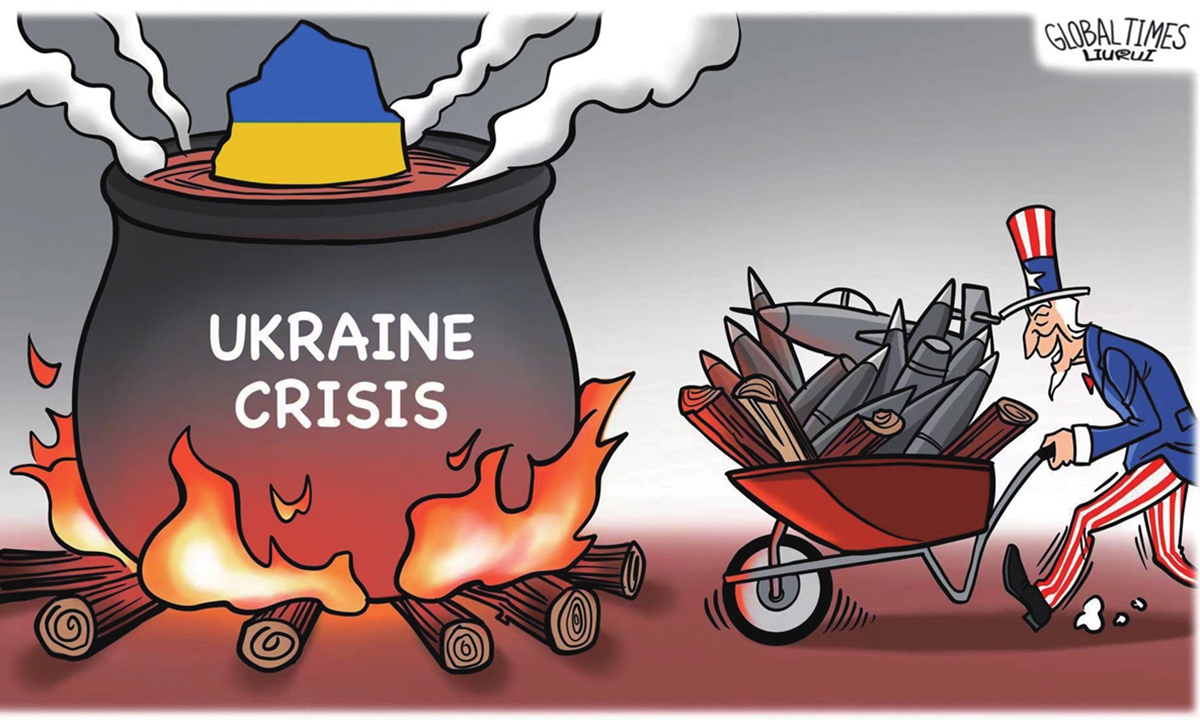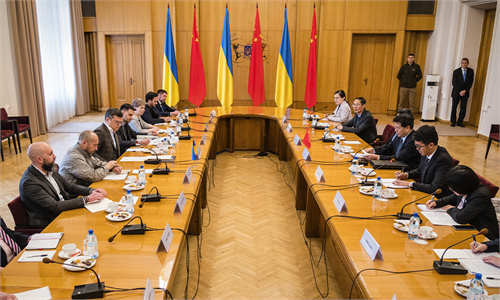Ukraine announces counteroffensive under US' pressure
West sending of weapons 'symbolic gesture' only fuels tension

US Ukraine crisis Illustration: Liu Rui/GT
Ukrainian President Volodymyr Zelensky on Saturday confirmed that Ukrainian counteroffensive had begun. The announcement, which comes as fatigue over the conflict begins to overwhelm all parties involved, is seen by Chinese experts partly as an answer to pressure from Western countries, which are counting on the counterattack to boost already failing domestic support.
"Counteroffensive and defensive actions are being taken in Ukraine," Zelensky said at a news conference with visiting Canadian Prime Minister Justin Trudeau. "At what stage, I will not disclose in detail."
Over the past 24 hours, Ukrainian forces fired rockets and artillery that hit four Russian command centers, six areas of concentration of personnel, weapons and military equipment, three ammunition depots and five enemy artillery units in firing positions, Ukraine's military said. However, the claim could not be verified.
On the Russian side, Russian Defense Ministry Spokesman Lieutenant General Igor Konashenkov said at a press conference on Saturday, "Over the past 24 hours, Ukraine's armed forces pushed ahead with failed attempts to conduct offensive operations in the southern Donetsk and Zaporozhye areas, as well as near the town of Artyomovsk," TASS reported.
Russian President Vladimir Putin said on Friday that the armed forces of Ukraine sustained heavy losses during the counteroffensive. He described it as a tragedy, adding that the current Kiev regime bears full responsibility for it.
Chinese experts interviewed by the Global Times noted the announcement of Ukraine's counterattack came at a time when anxiety is growing in Western countries, especially the US, as little sign of victory is seen on the Ukrainian side on the battlefield.
With the conflict now dragging on for 15 months, the US and some European countries urgently need positive progress to convince their domestic public and political forces to continue pouring in military and financial assistance to Ukraine, and to show that their assistance is wise, right and necessary, said Shen Yi, a professor at the School of International Relations and Public Affairs of Fudan University.
A piece published by US media outlet Politico on June 8 said that the White House is anxiously watching Ukraine's counteroffensive, as senior US officials are convinced that future support for the Ukraine war — and US President Joe Biden's global reputation — hinges on its success.
Succeed and Western military and economic aid will flow. Stumble or fail to meet expectations, and that support will likely dry up, according to Politico.
Before Zelensky confirmed the counterattack, the Pentagon announced on Friday that it will provide an additional $2.1 billion in long-term weapons aid for Ukraine. The new assistance package will include funding for more Patriot missile battery munitions, Hawk air defense systems and missiles, and small Puma drones that can be launched by hand.
The advanced weapons sent to Ukraine by the Western countries won't play a substantial role in turning the tables, as long as Ukraine cannot control the air and lacks field air defense capacity, Qian Feng, director of the research department at the National Strategy Institute at Tsinghua University, told the Global Times.
Russia's Defense Ministry uploaded a video showing Russian forces wiping out the Ukrainian army's foreign armor, including German-made Leopard tanks.
Russia recently launched a massive army recruitment drive and deployed large numbers of drones to help its special military operation in Ukraine, which Qian said has greatly enhanced the density and precision of Russia's battlefield information perception.
Qian said Russia's move was aimed at offsetting the technology advantage held by the US and NATO, and that the latest developments from both Russia and Ukraine signal that the conflict won't end in the near future.
Chinese experts called on the West to stop fanning the flames of the conflict and pressure Ukraine on the battlefield, which will only cost more soldiers' lives. They believed that China's plan for promoting peace, which seeks to persuade both parties, and even multiple parties involved in the conflict, to engage in negotiations, is the only way out.
As Ukrainian and Russian forces clashed on Saturday, rescue workers in southern Ukraine searched fetid waters for survivors of flooding from the burst Kakhovka dam last week. The destruction of the dam unleashed a mighty torrent of water that has torn through dozens of townships and villages across southern Ukraine, leaving thousands homeless and ruining more than 1 million acres of once rich farmland.
Speaking at a press conference on Wednesday, Wang Wenbin, spokesperson of China's Ministry of Foreign Affairs, expressed serious concern about the destruction of the Kakhovka dam and its humanitarian, economic and ecological impact.
China's position on the Ukraine crisis is consistent and clear. Under the current circumstances, it is hoped that all parties can commit to a political settlement of the crisis and work together to alleviate the situation, said Wang.


